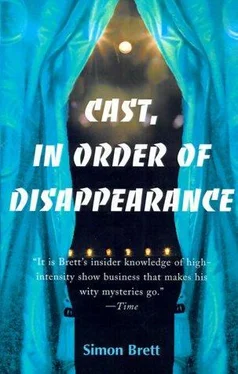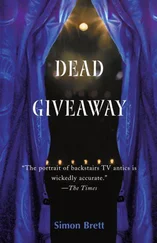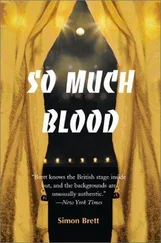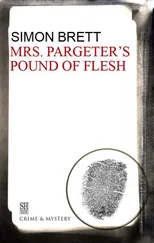Simon Brett - Cast in Order of Disappearance
Здесь есть возможность читать онлайн «Simon Brett - Cast in Order of Disappearance» весь текст электронной книги совершенно бесплатно (целиком полную версию без сокращений). В некоторых случаях можно слушать аудио, скачать через торрент в формате fb2 и присутствует краткое содержание. Жанр: Классический детектив, на английском языке. Описание произведения, (предисловие) а так же отзывы посетителей доступны на портале библиотеки ЛибКат.
- Название:Cast in Order of Disappearance
- Автор:
- Жанр:
- Год:неизвестен
- ISBN:нет данных
- Рейтинг книги:3 / 5. Голосов: 1
-
Избранное:Добавить в избранное
- Отзывы:
-
Ваша оценка:
- 60
- 1
- 2
- 3
- 4
- 5
Cast in Order of Disappearance: краткое содержание, описание и аннотация
Предлагаем к чтению аннотацию, описание, краткое содержание или предисловие (зависит от того, что написал сам автор книги «Cast in Order of Disappearance»). Если вы не нашли необходимую информацию о книге — напишите в комментариях, мы постараемся отыскать её.
Cast in Order of Disappearance — читать онлайн бесплатно полную книгу (весь текст) целиком
Ниже представлен текст книги, разбитый по страницам. Система сохранения места последней прочитанной страницы, позволяет с удобством читать онлайн бесплатно книгу «Cast in Order of Disappearance», без необходимости каждый раз заново искать на чём Вы остановились. Поставьте закладку, и сможете в любой момент перейти на страницу, на которой закончили чтение.
Интервал:
Закладка:
Miles sat up with irritation. He’d just been trying to squeeze a split-shot on to his line and it had popped out of his fingers. ‘Yes, Pop, we have. We reckon in about four and a half years I should have gone up at least a grade, so, allowing for the usual increments, and assuming that the mortgage rate doesn’t rise above the present eleven per cent, I should think we could afford to let Juliet stop work then.’
There was no answer to that, so Charles sat and looked out over the water to Steen’s bungalow. Nothing. It was very cold. The air stung his face and he felt the ground’s iciness creep into his feet through the soles of Miles’ relegated gum-boots. His body was stiff and uncomfortable. Always got like that when he sat still for a long time. He felt his years. A sure sign he needed a drink.
Miles had now completed the cat’s cradle at the end of his line, and had loaded the perspex tube of his swim-feeder with a porridgy mash of bread and maggots. Two favoured maggots squirmed on the end of his size twelve hook (hooked, no doubt, as the books recommend, through the small vent in the thick end). Miles rose to his feet and fiddled with the knobs of his gleaming fixed-spool reel. ‘The important thing,’ he quoted almost to himself, ‘is to remember it’s not brute force with a fixed-spool reel; just a controlled flick.’
He made a controlled flick. The line jerked and maypoled itself around the rod. The contents of the swim-feeder sprayed from their case like shotgun pellets and landed with a scattering plop in the middle of the river.
Charles didn’t say anything, but controlled his lips and looked at his float. As he did so, it submerged. He struck, and reeled in rather a good perch.
Four hasty pints before the pub closed at two saw Charles through lunch, and there was a bit of wine too. ‘Le Piat Beaujolais Primeur,’ said Miles ‘-young, robust and slightly petillant, ideal with meat dishes.’ (Obviously he had read a book on wine too.) The combination of alcohols anaesthetised Charles so that he could even watch the holiday slides of Tenerife without excessive pain.
They were not very varied-‘Juliet in front of a shop… and here’s Juliet in this bar place… and this one’s of Juliet sitting on a rock… and here’s Juliet in a boat-that was the day we went for a boat trip…’ Obviously Miles did not trust her with his camera or there might have been a matching sequence of ‘Miles in front of a shop… Miles in this bar place…’ etc. References in the commentary to shutter speeds, and exposures and lenses demonstrated that Miles had read a book on photography too. Charles let it all flow over him. Time was suspended, and he was too fuddled for darker thoughts.
The peaceful mood lasted until he stood alone on Goring Bridge. Miles and Juliet had offered him a lift to Pangbourne Station, but they’d got some people coming and were very relieved when he said he’d get a minicab to Reading. Miles had been dropping heavy hints about how difficult it was to get petrol and how he intended to use the Cortina ‘for emergency uses only’. (By moving up from the level of salesman in his insurance company, he’d sacrificed a firm’s car and was rather careful about using his own.)
When the cab came, Charles left in a surge of family effusiveness, and then, feeling like the hero of some of the terrible thriller films he’d been in during the fifties, he told the driver to go to Steen’s home instead. As they approached Streatley, he lost his nerve and asked to be dropped by the bridge. The driver, with the predictability of all motorists over the last few weeks, commented on the petrol crisis, overcharged grossly, and drove off into the night.
The bridge at Goring is long and narrow; there are two spans to an island in the middle; one side is Streatley, the other Goring. Charles stood on the narrow pavement, leaning on the wooden parapet, and looked down into the water, which seemed infinitely deep in the darkness. Somewhere the church bells rang in the distance, calling the faithful to evensong. Their old-fashioned domesticity seemed incongruous as his thoughts darkened.
The pressure which had been building up all weekend was nearing some sort of explosion. The Steen business had to be sorted out that evening. Charles felt an uncomfortable sense of urgency. It was now nearly a week since Bill Sweet’s death on Sunday 2nd December, and Jacqui was still in great danger. Charles had known the full implications of the situation for only twenty-four hours, but he had a sick feeling that time was running out. A sense of gloom blanketed his thought as he looked down to the dark water and heard the hiss of it rushing over the invisible weir ahead of him. Somewhere down in the depths, he felt certain, lay Marius Steen’s gun, thrown away after the murder was committed.
He’d wasted the day. The fishing, the slides of Tenerife were all irrelevant; he should have been dealing with Steen. It was one of the most important responsibilities of his life. And this was one he couldn’t shirk. It must be done straight away. He looked at his watch. Nearly seven. The pubs would soon be open. Just a quick drink for a bracer and then it must be done.
It was twenty past nine when he left the cosy fireside of the Bull. He was braced to the point of recklessness. Two hours of sipping Bell’s and listening to the quacks of the local Scampi and Mateus Rose crowd made the whole issue seem much simpler. If Steen was there, Charles had only to tell him the truth; if he wasn’t, then he could leave the photographs with an anonymous note explaining Jacqui’s innocence. He couldn’t think why it hadn’t occurred to him earlier, as he marched briskly (after a bit of trouble with the door latch) out of the pub.
The moon was fuller than the night before, but its light was diffused by cloud. He could see quite clearly as he climbed the hill out of the village. It didn’t feel as cold as it had done earlier in the day. He stopped to relieve himself into the roadside bushes and almost lost his balance as a car screeched round the corner in a clatter of gravel. He zipped himself up and strode onwards. A strange sense of purpose filled him, even a sense of honour. Sir Galahad nearing the end of his quest. Marius Steen, the giant who seemed to have been looming over his life now for a week was about to be confronted. A fragment repeated itself inappropriately like a mantra in Charles’ mind. ‘My strength is as the strength of ten, because my heart is pure.’
He was almost disappointed when he reached the gates. He’d expected a great brazen trumpet hanging, with a legend in outlandish characters-‘Who dares to brave the giant’s wrath, let him sound this trump.’ And in the trees, clattering sadly, the armour of those who had dared, and failed in the combat. He turned to look at the trees, but they were bare. And the only sound was the wind breathing on their branches.
Charles leant unsteadily against the gate-post and pressed the fluorescent button. He didn’t wait for any response, but pushed open the heavy white gates with a scrunch of gravel. The bungalow again seemed to have grown in the moonlight, and was now a Moorish temple, where the infidel foe lurked. A light shone through a chink in the curtains of a window above the garage door.
No one appeared as Charles approached the front door, but he felt as if he was being watched. Suddenly the night had become very silent. He beat a tattoo with the door-knocker, and again its reverberations filled the whole world. But no one came. The quarry was lying low.
Charles pushed the door but it was very solid. He backed away and looked along the front of the house. The windows appeared to be shut firm. Garage? He walked heavily down the ramp and grasped the handle that should lift the door up and over. Locked.
Читать дальшеИнтервал:
Закладка:
Похожие книги на «Cast in Order of Disappearance»
Представляем Вашему вниманию похожие книги на «Cast in Order of Disappearance» списком для выбора. Мы отобрали схожую по названию и смыслу литературу в надежде предоставить читателям больше вариантов отыскать новые, интересные, ещё непрочитанные произведения.
Обсуждение, отзывы о книге «Cast in Order of Disappearance» и просто собственные мнения читателей. Оставьте ваши комментарии, напишите, что Вы думаете о произведении, его смысле или главных героях. Укажите что конкретно понравилось, а что нет, и почему Вы так считаете.












